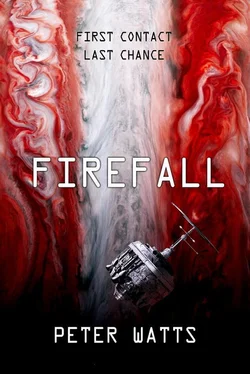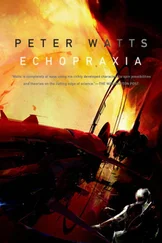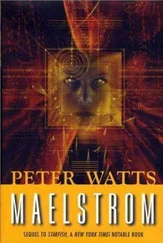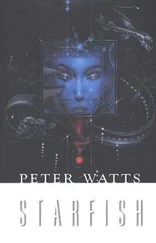A snapshot of the past: a corpse, laid out on the lawn. Brüks didn’t know which element was the more incongruous.
The lawn, he supposed. At least that was unexpected: not so much a lawn as a patchy threadbare rug of blue-green grass—rusty in the dim longwave vampires preferred—ripped from the walls of the hab and strewn haphazardly across the deck. Vampires had OCD, Brüks remembered vaguely. The mythical ones at least, not the ancient flesh-and-blood predators that had inspired them. Seventeenth-century folk legends had it that you could drive a vampire to distraction by the simple act of throwing salt in its path; some supernatural brain circuit would compel it to drop everything and count the grains. Brüks thought he’d read that somewhere. Probably not peer reviewed.
For all he knew, that ridiculous superstition might have at least a rootlet in neurological reality. It certainly wasn’t any more absurd than the Crucifix Glitch; maybe some pattern-matching hiccup in those omnisavant brains, some feedback loop gone over the top. Maybe Valerie had fallen victim to the same subroutine, seen all those thousands of epiphytic blades and torn them from their bulkhead beds with her bare fingernails, counting each leaf as it fluttered to the deck in a halfhearted chlorophyllous blizzard.
Of course, the catch was that vampires didn’t have to count : they would simply see the precise number of salt grains or grass leaves in an instant, know that grand seven-digit total without ever going through the conscious process of adding it up. Any village peasant who sacrificed two seconds scattering salt in his path would buy himself a tenth-of-a-second’s grace, tops. Not a great rate of exchange.
Maybe the zombie hadn’t known that, though. Maybe the homunculus behind the eyes had rebooted just in time to see what was coming, maybe it somehow wrested control back from all those shortcuts and back alleys and tried one last-ditch Hail Mary with nothing left to lose. Maybe Valerie had let it, watching, amused; maybe even played along, pretended to count each falling blade while her dinner turned the deck into a haphazard shag rug.
Maybe the zombie hadn’t even cared. Maybe it had just lain down on command and waited to be eaten. Maybe Valerie had just wanted a tablecloth.
The zombie’s throat had been slashed. It lay spread-eagled on its stomach, naked, face turned to the side. The right buttock had been carved away; the quads; one long strip of calf muscle. There was flesh above and flesh below: in between, a flensed femur connected the lower leg to the torso, socketed into the broad scraped spatula of the pelvic girdle.
There was very little blood. Everything had been cauterized.
“You never checked it out,” Brüks said.
Sengupta zoomed the view: the gory table setting expanded across the window. Blades of grass grew to the size of bamboo shoots; tooth marks resolved like jagged furrows on bared bloody bone.
Some kind of wire snaked through the grass—barely visible even at this magnification—and disappeared beneath the half-eaten corpse.
“Found eight wires don’t know what for exactly but that thing wasn’t exactly Secret Santa you know? Carnage said probably booby traps and Carnage is probably right for once. She wanted us to see this.”
“How do you know?”
“This is the only feed she didn’t break.” Sengupta waved the recording off the bulkhead.
“So you jettisoned the habs.”
She nodded. “Too risky to go in too risky to leave ’em there.”
Another feed abutted the first, a view down the truncated spoke that had once led to Valerie’s lair. It ended after only twenty meters now, in a pulsing orange disk flashing UNPRESSURIZED back up the tunnel at two-second intervals. Just like the Commons spoke opposite, cut loose in turn to keep the vectors balanced.
He remembered downhill conversations, the sound of glasses clinking together. “Shit,” he said.
“It’s not like they’re not all the same you know they all got the same plumbing and life support.”
“I know.”
“And it’s not like we’re gonna run out of food or air what with everybody being dead and—”
“I fucking know, ” Brüks snapped, and was surprised when Sengupta fell immediately silent.
He sighed. “It’s just, the only half-decent moments I’ve had on this whole bloody trip were in Commons, you know?”
She didn’t speak for a moment; and when she did, Brüks couldn’t make out the words.
“What did you say?”
“You talked to him down there,” she mumbled. “I know that but it doesn’t matter even if it was still here he’s not. He just sits up in the attic and runs those signals over and over like he never even left Icarus…”
“He lost his son,” Brüks said. “It changed him. Of course it changed him.”
“Oh yah.” She barely spoke above a whisper. Something in that voice made Brüks long for the trademark hyena laugh. “It changed him all right.”
No excuses left. Nothing else to do.
He ascended into the Hub, breached its sky into the guts beyond: hissing bronchioles, cross-hatched vertebrae, straight-edged intestines. He moved like an old man, free fall and residual paralysis and the spacesuit he’d scavenged from the cargo-bay airlock all conspiring to take him to new depths of clumsiness. Up ahead, the paint around the docking hatch splashed the surrounding topography with the usual diffuse glow.
This is where the shadows come, Brüks realized. Every other corner of the Crown is bright as a swimming pool now that the Hold’s off-limits, now that Valerie’s cave has been cut loose. Shadows don’t have a chance back there.
They’ve got nowhere else to go…
“Welcome back to the land of the living.”
Jim Moore turned slowly in the rafters, just past the airlock. The lines of his face, the edges of limbs moved in and out of eclipse.
“This is living?” Brüks tried.
“This is the waiting list.”
He thought he might have seen a smile. Brüks pushed himself across the attic and pulled a welding torch from the tool rack: checked the charge, hefted the mass. Jim Moore watched from a distance, his face full of shadow.
“Uh, Jim. About—”
“Enemy territory,” Moore said. “Couldn’t be helped.”
“Yeah.” A fifth of the world’s energy supply, in the hands of an intelligent slime mold from outer space. Not a cost-benefit decision Brüks envied. “The collateral, though…”
Moore looked away. “They’ll make do.”
Maybe he was right. Firefall had slowed Earth’s headlong rush to offworld antimatter; a power cord stretched across a hundred fifty million kilometers was far too vulnerable for a universe in which godlike extraterrestrials appeared and vanished at will. There were backups in place, fusion and forced photosynthesis, geothermal spikes driven deep into the earth’s crust to tap the leftover heat of creation. Belts would be tightened, lives might be lost, but the world would make do. It always had: the beggars and the choosers and the spoiled insatiable generations with their toys and their power-hungry virtual worlds. They would not run out of air, at least. They would not freeze to death in the endless arid wastes between the stars.
For Moore so loved the world that he gave his only begotten son. Twice.
“Anyway,” Moore added, “we’ll know soon enough.”
Brüks chewed his lip. “How long, exactly?”
“Could be home in a couple of weeks,” Moore said indifferently. “You’d have to ask Sengupta.”
“A couple—but the trip down took—”
“Using an I-CAN running on half a tank, and keeping our burns to an absolute minimum. We’re on purebred beamed-core antimatter now. We could make it to Earth in a few days if we opened the throttle. We’d just be going too fast to stop when we got there. End up braking halfway to Centauri.”
Читать дальше








